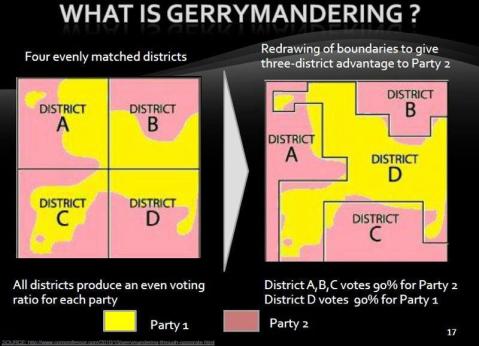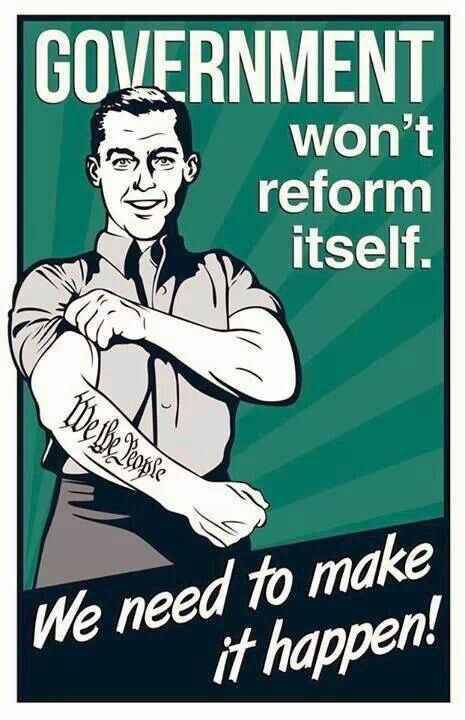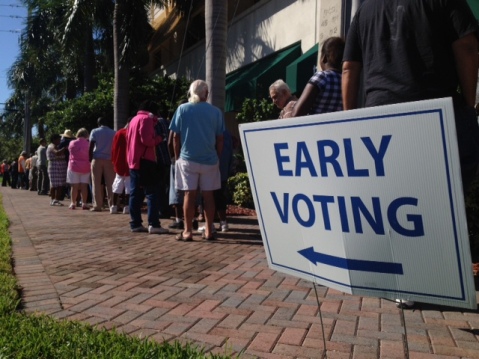To bring U.S. elections in line with international standards, abolish Electoral College
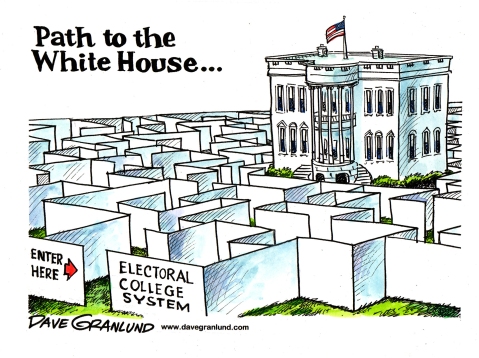
The U.S.’s long national nightmare of Election 2016 is one step closer to coming to an end, with electors gathering across the country today to cast ballots in the Electoral College. This in all likelihood will result in billionaire Donald J. Trump becoming the country’s 45th president, solidifying the descent of the United States into a bona fide oligarchy, defined by Merriam-Webster as “a government by the few … in which a small group exercises control especially for corrupt and selfish purposes.”
It also serves as a stark reminder of the archaic and undemocratic nature of U.S. elections, in which the winner of the popular vote – in this case Hillary Clinton – can be denied the presidency because of an indirect electoral system conceived in the 18th century as a way for slave states to maintain political hegemony. By counting enslaved African Americans as three-fifths of a person, while simultaneously denying them the right to vote, wealthy white landowners in the South were able to maintain disproportionate political control over the federal government for generations.
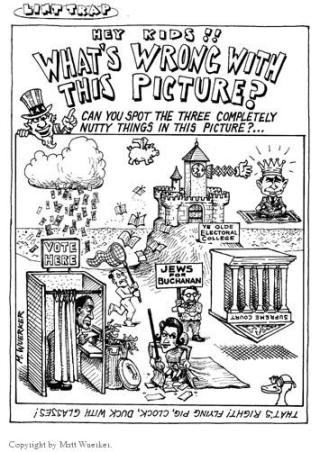 Now, for the second time in the young 21st century, the popular vote loser is assuming the White House solely due to this antiquated, undemocratic system of choosing presidents. In both cases, the Electoral College has handed the election to a Republican with authoritarian tendencies, meaning that without this controversial electoral method, there would have been no Republican presidents this century, and the world would probably be a very different place.
Now, for the second time in the young 21st century, the popular vote loser is assuming the White House solely due to this antiquated, undemocratic system of choosing presidents. In both cases, the Electoral College has handed the election to a Republican with authoritarian tendencies, meaning that without this controversial electoral method, there would have been no Republican presidents this century, and the world would probably be a very different place.
While it is impossible to predict what Al Gore (who received half a million more votes than George W. Bush) would have done as president, in all likelihood there would have been no Iraq War, no torture regime, no Guantanamo Bay – all of which have been instrumental in facilitating the descent into lawlessness and international chaos that is coming to define this century. It is clear, at least, that the undemocratic nature of U.S. elections, including but not limited to the problematic Electoral College, has real-world implications that reverberate well beyond the borders of the United States.
If the United States hopes to bring its procedure for choosing its leaders in line with international standards for democratic elections, a good place to start would be to abolish the Electoral College. International election observers have noted what an oddity this system is, with the Organization for Security and Cooperation in Europe observing that “the system allows for a candidate to win the popular vote nationwide while falling short of the majority of Electoral College votes.”
Observers from the Organization of American States, in their recent assessment of the November elections, pointed out that
The U.S. electoral system presents several characteristics that make it unique in the hemisphere. One of these aspects is the Electoral College by which the President is elected through an indirect vote consisting of the accumulation of electoral votes tallied state by state, as opposed to the most common electoral practice of direct election through popular vote.
Although there are a dozen or so recognized electoral systems around the world and while the United States is not bound to ensure that its electoral practice follows the accepted procedures of other democracies, there are certain principles to which the U.S. has agreed, which may be violated to varying degrees by the Electoral College system.
The electoral commitments the United States has signed onto in such landmark international agreements as the 1990 OSCE Copenhagen Document and the International Covenant on Civil and Political Rights include such widely accepted international norms of “equal suffrage” which is fundamentally undermined by the Electoral College, in which the popular vote is discounted.
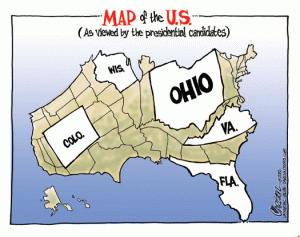 In the ICCPR, for example, the signatories agreed that “Every citizen shall have the right … [t]o vote and to be elected at genuine periodic elections which shall be by universal and equal suffrage and shall be held by secret ballot, guaranteeing the free expression of the will of the electors.”
In the ICCPR, for example, the signatories agreed that “Every citizen shall have the right … [t]o vote and to be elected at genuine periodic elections which shall be by universal and equal suffrage and shall be held by secret ballot, guaranteeing the free expression of the will of the electors.”
In the 1990 OSCE Copenhagen Document, the United States agreed that it would hold “free elections that will be held at reasonable intervals by secret ballot or by equivalent free voting procedure, under conditions which ensure in practice the free expression of the opinion of the electors in the choice of their representatives.”
This does not happen in the U.S. electoral system. The free expression of opinion of the electors is irrelevant in fact, since nearly three million more Americans chose the Democrat over the Republican, but the Republican is assuming the presidency anyway, due to the arcane and undemocratic Electoral College.
It is long since passed time to abolish this system and move towards direct elections under the principle of one-person-one-vote.
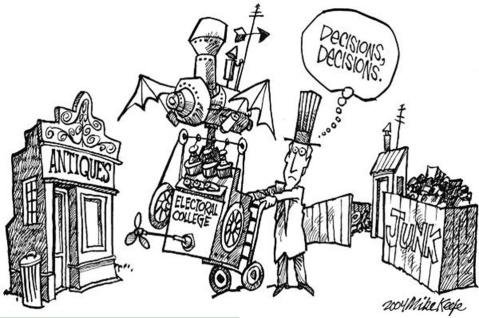
‘Rogue country’: International community reacts to U.S. election, frets over Trump presidency
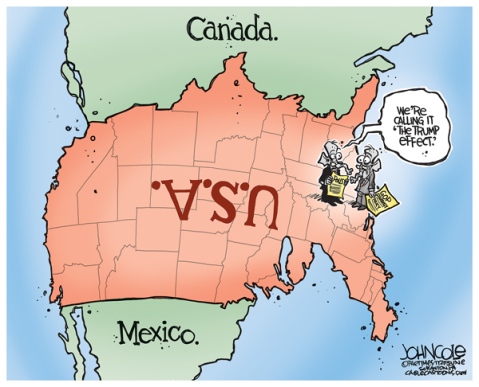
The international community was prepared to criticize the United States last week – regardless of who prevailed in the election – for its arcane, highly decentralized and deeply flawed electoral system. Now, with Donald J. Trump poised to become the 45th president, there are myriad other reasons to criticize the U.S. as well.
Two international organizations deployed election observation missions to the United States to monitor the vote, and while their final reports varied considerably, both the Organization of American States and the Organization for Security and Cooperation in Europe highlighted numerous deficiencies in the way the United States chooses its leaders.
Although generally positive in its tone, the OAS final report identified the following issues as representing key areas for improvement in the U.S. electoral system:
- Taking measures to avoid the excessive concentration of voters and long lines in the voting centers.
- Broaden the cooperation between states to compare information and avoid possible duplications in voter registries.
- Expand the practice of designing electoral districts through independent, non-partisan commissions.
- Analyze the impact of the decision of the Supreme Court to eliminate parts of the Voting Rights Act of 1965.
- Establish better and stricter rules to govern PACs and super PACs.
- Leave behind the polarizing and divisive campaign rhetoric and promote a civil dialogue between opposing visions.
The OAS also noted the unusual practice in the United States of simultaneously requiring voter identification while not providing this required identification.
“Practically all countries in the region provide at least one free form of national identification to their citizens, which is used for electoral purposes,” said the OAS, which represents 35 independent countries of the Western hemisphere. “In the U.S., 32 states currently have laws in force that require voters to show some form of prescribed identification to verify their identity before casting a vote.”
However, these states do not make this identification readily available to citizens, contrary to good practice.
This is also a weakness that the OSCE pointed out in its report, noting:
Voter identification rules are politically divisive and vary across the states, with 32 states requiring photo identification. A high volume of litigation regarding voter identification continued up to election day, generating confusion among voters and election officials regarding the application of rules. Efforts to ensure the integrity of the vote are important, but should not lead to the disenfranchisement of eligible voters.
As the OSCE also pointed out: “Recent legal changes and decisions on technical aspects of the electoral process were often motivated by partisan interests, adding undue obstacles for voters. Suffrage rights are not guaranteed for all citizens, leaving sections of the population without the right to vote.”
The 57-member state organization also noted the undue obstacles faced by minor parties and independents trying to compete in U.S. elections.
“The number of signatures required and the signature submission deadlines vary from state to state, which made it cumbersome for third party or independent candidates to register across all states for presidential elections,” the OSCE pointed out. “Both the Green Party and Libertarian Party challenged ballot access requirements in several states, with success in a few instances.”
Campaign financing’s lack of transparency and ineffective enforcement of campaign finance laws was also noted:
The Federal Election Commission (FEC) oversees a campaign finance regime that imposes few actual limits on donations and does not limit expenditure. All financial reports are published expeditiously, but transparency is diminished by the absence of disclosure for some types of non-profit organizations that play an important role in the campaign. Partisan decision making has limited the FEC’s ability to reach decisions on key campaign finance issues.
The election-rigging process known as gerrymandering was also highlighted as a problem, with the OSCE pointing to “longstanding concerns that redistricting is a largely partisan process, which has led to a number of uncompetitive contests.” The election watchdog noted that 28 candidates for the House ran unopposed in these elections.
The undemocratic nature of the U.S.’s indirect elections – enabled by the controversial Electoral College system – was also alluded to, with the OSCE noting that “the system allows for a candidate to win the popular vote nationwide while falling short of the majority of Electoral College votes.”
This is precisely what appears to have taken place in Election 2016, with Donald Trump assuming the presidency despite his opponent Hillary Clinton receiving some 800,000 more votes nationwide than Trump. It is the second time this century that the popular vote loser has prevailed in the Electoral College and will move into the White House despite a plurality of voters preferring someone else.
Beyond the electoral system itself, international leaders are now raising concerns about the specter of a Trump presidency and what it will mean for the global system of alliances, international agreements, trade regimes, and international law. In particular, with Trump having repeatedly threatened to pull the U.S. out of the landmark Paris Agreement on climate change, global figures such as UN Secretary General Ban Ki-moon stressed the importance of continued U.S. engagement in multilateral diplomacy.
The day after the election, the UN chief noted that today’s global challenges demand concerted global action and joint solutions.
“As a founding member of the United Nations and permanent member of the Security Council, the United States is an essential actor across the international agenda,” Ban said. “The United Nations will count on the new Administration to strengthen the bonds of international cooperation as we strive together to uphold shared ideals, combat climate change, advance human rights, promote mutual understanding and implement the Sustainable Development Goals (SDGs) to achieve lives of peace, prosperity and dignity for all.”
Mary Robinson, a former Irish president and UN human rights chief, warned that the United States would become “a kind of rogue country” if it pulls out of the Paris Agreement, leaving the world more vulnerable to droughts, hurricanes, rising sea levels, high temperatures and other climate extremes.
“It would be a tragedy for the United States and the people of the United States if the U.S. becomes a kind of rogue country, the only country in the world that is somehow not going to go ahead with the Paris Agreement,” Robinson said.
Trump has promised to pull the United States out of that global climate accord, which was agreed last year by 193 countries and which went into effect earlier this month. If he follows through on this campaign pledge, European leaders may call for a carbon tax on American imports.
“Donald Trump has said – we’ll see if he keeps this promise – that he won’t respect the conclusions of the Paris climate agreement,” said French presidential candidate Nicolas Sarkozy on November 13.
“Well, I will demand that Europe put in place a carbon tax at its border, a tax of 1-3%, for all products coming from the United States, if the United States doesn’t apply environmental rules that we are imposing on our companies,” he added.
Another area of concern to U.S. allies is what Trump’s victory means for the NATO military alliance. In an interview with the New York Times last July, Trump indicated that he would make U.S. military commitments to the NATO alliance – predicated on principles of collective defense – conditional upon other countries’ financial contributions to the alliance.
European Union leaders held an emergency meeting in Brussels Sunday night, dealing in part with this question and also exploring issues such as possible U.S. policy changes towards Russia and Iran.
EU foreign policy chief Federica Mogherini said after Sunday’s dinner that “values, principles, interests” will continue to form the basis of the alliance with the United States, and said that Europe is “looking forward to a very strong partnership with the next administration.”
“We would like to know what intentions he has regarding the [NATO] alliance. We must know what climate policies he intends to pursue. This must be cleared up in the next few months,” said European Commission President Jean-Claude Juncker.
Others are raising concerns that Trump will follow through on campaign promises to reinstate the Bush administration’s torture regime, an illegal policy that was halted – but not punished – by the Obama administration.
Despite Obama’s touted “reaffirmation” of the ban on torture, “Trump easily could rescind Obama’s orders and direct the CIA to capture and humanely interrogate terror suspects in secret overseas, something many Republicans have urged,” noted Ken Dilanian at NBC News. “Trump also has some wiggle room via executive order on what constitutes torture, despite the change in the law.”
As Margaret Huang, executive director of Amnesty International USA, pointed out in a blog post on Monday,
Trump has said that not only does he “like” waterboarding, he doesn’t think it goes far enough.
Apparently, it bears repeating: Waterboarding is torture. And it is therefore a gross violation of human rights law. Waterboarding was banned by the military in the 2006 Army Field Manual. President Obama extended the ban to the CIA with an executive order in 2009.
Torture of any kind does not make anyone safer as information gathered under such circumstances is highly suspect. It undermines the standing of any country that seeks to influence others when it comes to human rights.
The United States’ history of using torture against prisoners is deeply shameful. It must remain in the past.
Other possible Trump policies that she highlighted as problematic from a human rights perspective include: closing the door on refugees, banning Muslims from entering the US, building a wall between the United States and Mexico, restrictions on reproductive freedom, and allowing more guns on U.S. streets.
Others have raised concerns that the permissive body of “secret law” that has purportedly guided the U.S. drone assassination policy under President Obama will be carried over into the Trump administration. This is especially worrisome because Trump has already made clear his intentions to target not just suspected terrorists but also their families in what would be a clear-cut war crime against non-combatants.
As Jameel Jaffer, deputy legal director at the American Civil Liberties Union, writes today in the Guardian:
Now the lethal bureaucracy whose growth Obama personally oversaw will be turned over to a new administration. The powers Obama claimed will be wielded by another president. Perhaps as significant is the jarring fact that the practice of targeted killing – assassination, as it would once have been called, without a second thought – no longer seems remarkable, and the fact that the United States now boasts a legal and bureaucratic infrastructure to sustain this practice. Eight years ago the targeted-killing campaign required a legal and bureaucratic infrastructure, but now that infrastructure will demand a targeted-killing campaign. The question the next president will ask is not whether the powers Obama claimed should be exploited, but where, and against whom.
Those who oppose these policies – whether on the grassroots level, within the U.S. government, or in the international community – should act now to ensure that Trump feels the pressure from day one before he launches an international crisis with brash and ill-conceived initiatives such as pulling the U.S. out of the Paris Agreement, reinstating torture or expanding Obama’s illegal assassination program.
A good place to start would be protesting the planned inauguration ceremonies on January 20, 2017. A number of groups are already organizing to do just that. See these websites for more information:
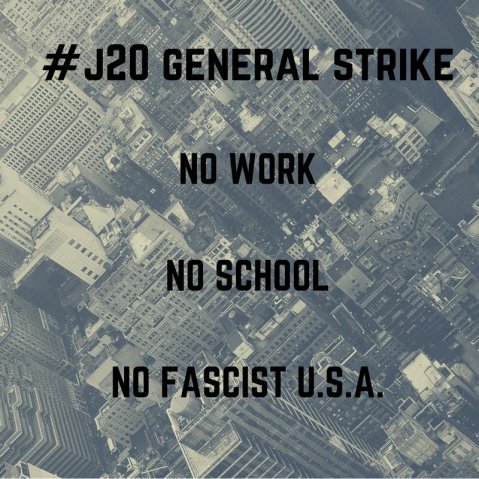
Yes, U.S. elections are rigged but not the way Trump means it
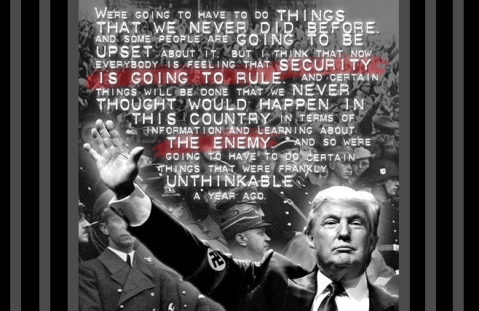
Republican presidential nominee and proto-fascist Donald Trump has been making headlines this week with assertions that the U.S. electoral process is “rigged” – even going so far as to claim that the only way he could possibly lose the battleground state of Pennsylvania to Hillary Clinton is if widespread cheating takes place there.
“The only way we can lose, in my opinion, I really mean this, Pennsylvania, is if cheating goes on. I really believe it,” he said last Friday during a rally in Altoona, Pa. “That’s the way we can lose the state, and we have to call up law enforcement and we have to have the sheriffs and the police chiefs and everybody watching.”
Now, Trump is recruiting so-called “election observers” to help monitor the vote across the country, launching a new page on his campaign’s website calling on supporters to “Help Me Stop Crooked Hillary From Rigging This Election!” Although details of the program are unclear, some are raising concerns about potential Election Day confrontations between voters and overzealous Trump backers – and pointing out the general absurdity of the type of election-rigging that Trump is hinting at.
In a piece for The Guardian, Jimmy Camp, a former Republican operative and a founding member of the Young Republican Federation of California, notes that rigging an election on the national level would require such a degree of coordination as to render it virtually impossible. To effectively swing a presidential election, this is what would the Clinton campaign would have to do, according to Camp:
- Bring on a national voter fraud coordinator. (Perhaps the Clinton Foundation could pay for the program?)
- Hire a statewide voter fraud coordinator that answered to the national voter fraud coordinator in Colorado, Florida, Iowa, North Carolina, Virginia, Ohio and Pennsylvania.
- Enlist a county voter fraud coordinator in each of the targeted states.
Each county coordinator in the targeted state would place ads on Craigslist recruiting supporters who were willing to commit a felony and vote multiple times.
While this sort of widespread coordination is virtually impossible to reach in order to impact a national election in a system as decentralized as the U.S. electoral process – described by one expert as “decentralized to the point of being dysfunctional” – there are in fact very serious concerns about the fairness of elections in the United States. These concerns, however, are likely not what Trump has in mind when he complains about a “rigged process.”
First of all, the most effective – and notorious – method of rigging electoral outcomes in the United States has nothing to do with presidential elections. The highly politicized process of congressional redistricting, which often leads to the controversial practice known as gerrymandering, is how the Republican and Democratic parties ensure that congressional districts are drawn in a way to protect incumbents and thwart genuine competition.
International election observers deployed by the Organization for Security and Co-operation in Europe to monitor U.S. adherence to election-related commitments have long pointed to the prevalence of gerrymandered congressional districts as one of the major hindrances to holding democratic elections in the United States.
The OSCE’s final report on the 2010 midterm elections, for example, noted that due to gerrymandering, “There is a broad perception that a significant number of congressional districts are non-competitive as the outcome of the election could be predicted with a high degree of probability. In these mid-term elections, one senator and 27 candidates for members of the House were elected unopposed.”
The OSCE reiterated a recommendation contained in the final report on the 2006 midterm elections: “With a view to ensuring genuine electoral competition in congressional districts, consideration could be given to introducing procedures for drawing district boundaries that will be based on criteria other than voters’ voting histories and perceived future voting intentions.”
In a publication issued in 2013, the OSCE further criticized the American system of drawing congressional districts. “Electoral constituencies should be drawn in a manner that preserves equality among voters,” noted the OSCE, adding that “the manner in which constituencies are drawn should not circumvent the principle of equal suffrage.”
When it comes to presidential elections, there is also some concern over what could be called election-rigging, particularly by unfairly restricting ballot access and erecting unrealistic barriers to inclusion in televised debates, but this is not something that should concern Trump or Clinton.
While the two big parties are guaranteed ballot access in all 50 states, smaller parties must meet rigorous requirements to even be listed on the ballots, requirements that vary considerably from state to state. Democrats and Republicans also benefit from taxpayer subsidies in the form of public funds to hold party conventions and private primary elections, which in many cases exclude independents from voting.
There is also a massive funding advantage enjoyed by the Democrats and Republicans, who raised over a billion dollars each in the last presidential election. Compare that to just under a million dollars raised by the Green Party in 2012 and 2.5 million raised by the Libertarian Party.
Considering these disparities, the playing field is obviously tilted in this scenario and the deck stacked against upstart parties seeking to challenge the status quo of the two-party system.
Whether or not this should be considered a “rigged election,” this unfair process is likely a violation of the election commitments laid out in the OSCE Copenhagen Document, which the United States signed in 1990.
This agreement requires OSCE member states to hold “free elections that will be held at reasonable intervals by secret ballot or by equivalent free voting procedure, under conditions which ensure in practice the free expression of the opinion of the electors in the choice of their representatives.”
Further, OSCE countries must
respect the right of citizens to seek political or public office, individually or as representatives of political parties or organizations, without discrimination;
respect the right of individuals and groups to establish, in full freedom, their own political parties or other political organizations and provide such political parties and organizations with the necessary legal guarantees to enable them to compete with each other on a basis of equal treatment before the law and by the authorities;
By hindering the ability of independent parties to compete, the U.S. is failing to live up to these international standards, which is particularly the case considering the lack of media access that “third parties” tend to receive.
To help their electoral chances and to help ensure that American voters are provided genuine choices in Election 2016, the two biggest third parties in the U.S. – the Libertarian Party and the Green Party – sued the Commission on Presidential Debates to permit their inclusion in debates against Hillary Clinton and Donald Trump.
Although the case was dismissed by the United States District Court for the District of Columbia, notably the court did not rule on the merits of the case but rather on the legal standing of the plaintiffs. According to the ruling, issued earlier this month:
The Libertarian and Green Parties and their political candidates sought, and failed to receive, invitations to privately-sponsored presidential debates in 2012. They now seek invitations to this year’s presidential debates, claiming that the rules that bar their participation violate antitrust law. However, because Plaintiffs have no standing and because antitrust laws govern commercial markets and not political activity, those claims fail as a matter of well-established law. Plaintiffs also allege violations of the First Amendment, but those claims must be dismissed because the First Amendment guarantees freedom from government infringement and Defendants here are private parties. Finally, Plaintiffs fail to allege facts that could support a claim for intentional interference with prospective business advantage.
Subsequently, the Green Party has launched a petition to “open the debates.”
The petition to the Commission on Presidential Debates reads, in part:
We, the undersigned, demand that the Presidential debates include all Presidential candidates who have qualified for enough state ballots to be a choice for a majority of voters.
Polls show that 50% of Americans do not identify as either Democrat or Republican. This means that the Presidential debates as currently managed are locking out the diverse voices and views of half of all Americans….
The need for “more voices and choices” can be met by including all candidates who are on the ballots for a majority of voters, a number that has typically ranged from 4 to 6 candidates in total.
Voters have a right to hear directly from their possible choices for the highest office in the land. These choices should reflect the diversity of American political opinion, and not be restricted to two candidates nominated by establishment parties awash in corporate donations and billionaire support.
While so far the Commission on Presidential Debates seems to be sticking to its guns in excluding the Libertarian and Green Parties from the debates, there do seem to be some openings so far this year for improved media coverage of third parties. While in the past, the media has studiously ignored presidential candidates considered outside the mainstream, this year – with a fascist lunatic heading the GOP ticket and a brazenly corrupt influence peddler heading the Democratic Party ticket – there seems to be a bit more cordiality being shown by the media to alternative voices.
CNN, for example, has hosted two “town hall” events featuring the Libertarian and Green presidential nominees, which can be viewed below.
The struggle continues however for a level playing field for all U.S. political parties.
To sign the petition demanding open four-way televised debates between the Democrats, Republicans, Libertarians and Greens – and to help unrig the electoral process in the United States – click here.
See below for an interview with Green Party presidential nominee in which she discusses the actual rigging of elections that takes place in the United States:
Chaotic, arbitrary primary process underscores need for U.S. electoral reform
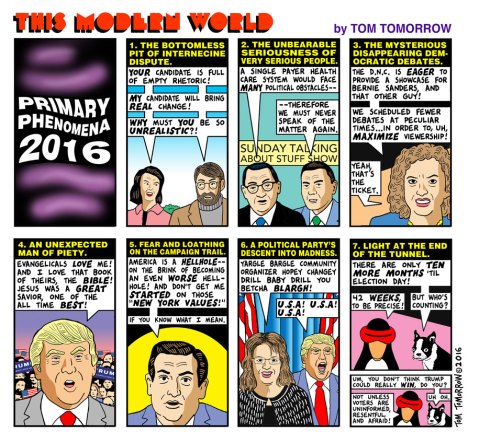 Super Tuesday is afoot, with 661 delegates at stake in the Republican primary and 865 delegates for the Democrats. This means that a presidential candidate who does well could shift the momentum and change the media narrative in a way that fundamentally alters the course of Election 2016. Or not.
Super Tuesday is afoot, with 661 delegates at stake in the Republican primary and 865 delegates for the Democrats. This means that a presidential candidate who does well could shift the momentum and change the media narrative in a way that fundamentally alters the course of Election 2016. Or not.
Among the 12 states and one U.S. territory voting on March 1 are Alabama, Arkansas, Georgia, Massachusetts, Minnesota, Oklahoma, Tennessee, Texas, Vermont and Virginia. Voting occurs throughout the day, with polls closing at different times depending on the state. Polls in Alabama, Georgia, Vermont and Virginia close at 7 p.m., while Massachusetts, Oklahoma and Tennessee close their polls at 8 p.m. In Texas, some polls close at 8, but others close at 9. Arkansas’ polls close at 8:30 p.m. Alaska’s caucuses close around midnight.
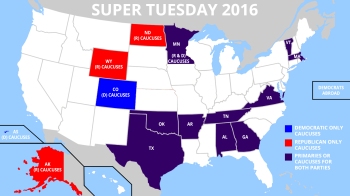 The big day, which could make or break several candidates on the Democratic and Republican sides (those who haven’t already dropped out after disappointing showings in earlier primary states), underscores the largely arbitrary and chaotic nature of United States primary elections, which are something of an oddity in advanced democracies.
The big day, which could make or break several candidates on the Democratic and Republican sides (those who haven’t already dropped out after disappointing showings in earlier primary states), underscores the largely arbitrary and chaotic nature of United States primary elections, which are something of an oddity in advanced democracies.
While primaries as such are relatively common, with many European countries organizing similar processes to nominate party leaders who then go on to assume the post of prime minister, in the United States the elections have a special significance, because unlike most other Western democracies, the U.S. adheres to a relatively rigid two-party system that severely disadvantages independent and minor parties.
The underlying difference is that most European countries are multi-party parliamentary democracies, which means that national governments are derived from the majority in the parliament, and utilize a system of proportional representation which ensures that parties that receive a certain amount of votes (usually a threshold of three to five percent) are guaranteed seats in the parliament.
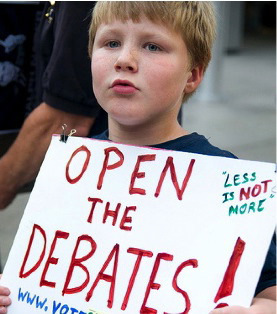 In the United States, which uses a strict and archaic winner-take-all system and erects severe obstacles to independent parties (including such challenges as stringent ballot access rules that vary widely from state to state and being excluded from televised debates), the two dominant parties are virtually ensured an effective monopoly over the political system. This means that the primaries are the only opportunity for the people of the United States to offer any significant input on who should assume the highest elected office in the land.
In the United States, which uses a strict and archaic winner-take-all system and erects severe obstacles to independent parties (including such challenges as stringent ballot access rules that vary widely from state to state and being excluded from televised debates), the two dominant parties are virtually ensured an effective monopoly over the political system. This means that the primaries are the only opportunity for the people of the United States to offer any significant input on who should assume the highest elected office in the land.
Because the primary process is so integral to the broader U.S. electoral system, being the only chance for average citizens to have a meaningful say in which of the two ultimate candidates becomes president, certain democratic principles should be applied to this process, for example, the electoral commitments the United States has signed onto in such landmark international agreements as the 1990 OSCE Copenhagen Document and the International Covenant on Civil and Political Rights.
In the ICCPR, for example, the signatories agreed that “Every citizen shall have the right and the opportunity … to take part in the conduct of public affairs, directly or through freely chosen representatives; [t]o vote and to be elected at genuine periodic elections which shall be by universal and equal suffrage and shall be held by secret ballot, guaranteeing the free expression of the will of the electors.”
In the 1990 OSCE Copenhagen Document, the United States agreed that it would hold “free elections that will be held at reasonable intervals by secret ballot or by equivalent free voting procedure, under conditions which ensure in practice the free expression of the opinion of the electors in the choice of their representatives.”
Subsequent paragraphs provide for “the right of citizens to seek political or public office, individually or as representatives of political parties or organizations, without discrimination; the right of individuals and groups to establish, in full freedom, their own political parties or other political organizations;” and call for such parties to be granted “the necessary legal guarantees to enable them to compete with each other on a basis of equal treatment before the law and by the authorities.”
The Copenhagen Document also “guarantee[s] universal and equal suffrage to adult citizens” and “ensure[s] that votes are cast by secret ballot or by equivalent free voting procedure, and that they are counted and reported honestly with the official results made public.” It further emphasizes the importance of avoiding discrimination among individual candidates and avoiding unnecessary obstacles to candidacies.
A strong case could be made that the U.S. electoral process is in one way or another violating just about every single one of these commitments. Not only do many U.S. states opt for a caucus system that is specifically designed to prevent any sort of secrecy of the vote (a universally accepted fundamental principle of free and fair elections), but perhaps more significantly, by utilizing a staggered system of primary elections, the United States is failing to guarantee universal and equal suffrage — and at the same time unfairly disadvantaging some candidates.
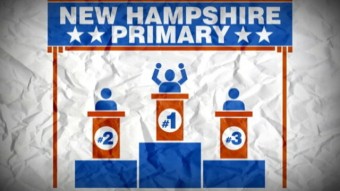 Because so much disproportionate weight is given to the states holding early primaries, including New Hampshire and Iowa, and because states holding primaries later – such as California – often don’t even get to vote for the same candidates (many of whom will have already dropped out by that time), the system is fundamentally flawed and effectively disenfranchises millions of would-be primary voters. (For example, New York, the third-largest state, voted after the nominees had been selected in both parties in 2000 and 2004.)
Because so much disproportionate weight is given to the states holding early primaries, including New Hampshire and Iowa, and because states holding primaries later – such as California – often don’t even get to vote for the same candidates (many of whom will have already dropped out by that time), the system is fundamentally flawed and effectively disenfranchises millions of would-be primary voters. (For example, New York, the third-largest state, voted after the nominees had been selected in both parties in 2000 and 2004.)
Further, the system itself is riddled with irregularities and an ad hoc, unprofessional and chaotic election administration framework that varies wildly from state to state. See, for example, the chaos that unfolded at a Nevada Democratic caucus on February 20, 2016:
Of course, there were also serious irregularities in the Republican Nevada caucuses. As reported by The Hill on Feb. 23:
Republican officials are looking into reports of double-voting at Tuesday night’s Nevada caucuses, according to multiple reports.
The party is currently reviewing the process, and a Republican National Committee official said the “chaos is contained,” according to Mashable.
One GOP official said the party will be reviewing a master sign-in sheet, according to well-known Nevada journalist Jon Ralston.
“Obviously we take reports of double-voting very seriously and we will be reviewing the ballots,” a GOP official said.
Or, consider the insanely arbitrary nature of the earlier Iowa caucuses, which decided many of its results not by secret ballot as required by international election-related commitments, but by flipping a coin:
More generally, candidates are not treated equally or fairly, because those who perform badly in the early primary and caucus states come under enormous pressure to end their candidacies before they have a chance to compete in Super Tuesday and later primary states such as Florida, California and New York, which hold the lion’s share of state delegates.
And of course, there is also the little matter of “superdelegates,” the 15 percent of Democratic National Convention delegates who are seated automatically and may choose to vote for whoever they want, regardless of the voters’ desires as expressed in primary elections. The superdelegates include distinguished party leaders and elected officials, including all Democratic members of the House and Senate and sitting Democratic governors.
Establishment favorite Hillary Clinton has already racked up support from at least 459 superdelegates, which effectively amounts to a thumb on the scale of the election. Although she only has 52 pledged delegates that she’s picked up through primary elections and caucuses, compared to 51 pledged to Bernie Sanders, she is ahead of Sanders in the overall delegate count by 503-70.
So, rather than being in a virtual dead heat, she is in fact leaps and bounds ahead of her democratic socialist rival. Some might call this a rigged game.
There is also the issue of widespread, profound and deep-seated media bias, which was recently described by independent journalist Amy Goodman on CNN’s Reliable Sources. In addition to criticizing the media’s over reporting of polling data and the so-called “horse race” approach to covering presidential campaigns, she described the disproportionate and unbalanced level of attention given to candidates such as Donald Trump compared to the paltry and unfavorable coverage given to Bernie Sanders.
“It is astounding that Bernie Sanders is where he is today,” she said. “Look at that Tyndall Center report that found in 2015, in the months leading up to December, you had 234 total network minutes, like almost four hours, CBS, NBC, ABC, covering Trump. That’s four hours and how much got coverage? Sanders got 10 minutes. On ABC World News Tonight in that year, Sanders got 20 seconds. Trump got like 81 minutes.”
This sort of media bias has been a frequent complaint by international observers monitoring U.S. elections. Following the U.S. midterm elections in 2014, observers from the OSCE noted that “while the elections benefitted from extensive media coverage, with diverse and critical analysis of many aspects of the campaigns, the actual interest of the public appeared limited.”
“The two main parties’ campaigns were widely covered in the media,” OSCE observers noted, but “much of the focus was on campaign funding and polling data rather than substantive policy issues.”
It seems that little has changed in this regard since those criticisms were leveled in November 2014. And as Election 2016 really starts to get underway, it’s not looking promising for a shift to more constructive and balanced media coverage.
This is a situation that should be remedied before the next election if the United States is to live up to its frequent claims that it is the world’s leading democracy — one that takes its international obligations seriously.
Equally important is fundamental reform of the primary process, for example through a national primary voting system — in which all presidential primaries are held on the same day — or at least opening up the general elections to independent and minor parties such as the Greens, so that the primary elections are not as fundamentally important as they are now.
Widespread criticism of U.S. human rights practices as 2016 gets underway
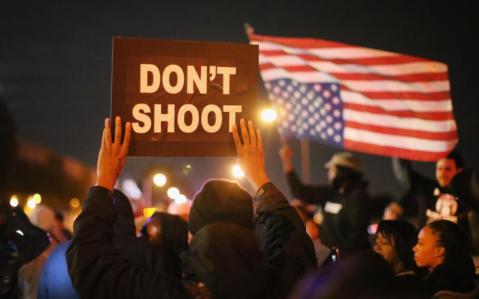
Numerous non-governmental organizations and a UN panel of experts last week issued a litany of serious concerns about the state of human rights in the United States as the new year – and President Obama’s final year in office – gets underway. Considering the depth and breadth of criticism, it is clear that Obama will be leaving behind a troubling legacy of human rights problems, which will prove not only a challenge for his successor (assuming the next president gives a whit about human rights), but also the nation as a whole for many years to come.
Amnesty International, for starters, issued a harsh statement on January 29, regretting that a full seven years into Obama’s presidency, the human rights abomination known as Guantanamo Bay remains open – despite Obama’s many promises over the years to close the notorious prison.
“Two weeks after the Guantánamo Bay detention site entered its 15th year of operation, the detention site faces a new milestone,” Amnesty noted in a press release Friday. “As of tomorrow, January 30, Guantánamo will have been open longer under President Obama’s administration than the previous administration which opened the site for indefinite detention.”
Marking the shameful milestone, Naureen Shah, director of Amnesty International USA’s Security and Human Rights program, issued the following statement:
With Guantánamo now open longer on his watch than on former President Bush’s, President Obama’s human rights legacy is on the line. In some ways, Obama will be defined by whether he chose to end fifteen years of injustice and human rights violations at Guantánamo.
President Obama was able to cut the prison’s population by nearly 10 percent this month alone and he must continue to show he’s undeterred by congressional threats and fear mongering. The prison should be shuttered, and detainees who cannot be transferred should be charged in federal court or released. There must be accountability for the torture and other human rights violations that many of the detainees have suffered.
Human Rights Watch also had some stern words for the United States last week. In publishing its annual catalogue of the state of human rights around the world, World Report 2016, HRW focused particular attention on misguided U.S. policies towards refugees and migrants. As the group pointed out on January 27,
In December 2014, the US opened its largest lock-up for arriving migrant families, a detention facility slated to house more than 2,400 parents and children – primarily asylum seekers from Guatemala, Honduras, and El Salvador. A year earlier, the US had only 85 beds specifically dedicated to detaining families. This new policy of detaining families from Central America in large numbers was in response to an influx of arrivals seeking refuge from uncontrolled gang violence in their home countries.
These policies, which criminalize and discriminate against “people seeking refuge or reunification with their families in the US during 2015 have been ill-considered, discriminatory, and harmful,” Human Rights Watch said.
“The Obama administration is sending messages of detention, discrimination, and distrust to families fleeing violence and persecution at home,” said Alison Parker, US program co-director at Human Rights Watch. “US policymakers should reverse course and stop treating undocumented arrivals as criminals.”
Other major concerns raised by HRW included:
- Harsh Sentencing
- Racial Disparities in Criminal Justice
- Drug Reform
- Police Reform
- Prison and Jail Conditions
- Poverty and Criminal Justice
- Youth in the Criminal Justice System
- Rights of Non-Citizens
- Labor Rights
- Right to Health
- Rights of People with Disabilities
- Women’s and Girls’ Rights
- Sexual Orientation and Gender Identity
- National Security
- Foreign Policy
When it comes to the issue of sentencing and mass incarceration, HRW noted that the United States locks up 2.37 million people, by far the largest incarcerated population in the world. Another 12 million people pass through local jails annually.
HRW noted that concerns over over-incarceration in prisons have led some states and the U.S. Congress to introduce several reform bills, but regretted that none of the federal congressional measures had become law.
The rights group also pointed out that racial disparities “permeate every part of the US criminal justice system,” with particularly egregious disparities when it comes to drug law enforcement.
“While whites and African Americans engage in drug offenses at comparable rates, African Americans are arrested, prosecuted, and incarcerated for drug offenses at much higher rates,” HRW pointed out. “African Americans are only 13 percent of the US population, but make up 29 percent of all drug arrests. Black men are incarcerated at six times the rate of white men.”
Racial disparities in criminal justice – and virtually all other facets of American life – were also in focus last week with the conclusion of an official visit by the UN’s Working Group of Experts on People of African Descent, which visited several U.S. cities from January 19-29.
Despite observing some positive indications of halting progress in certain areas – including a growing mass movement for racial justice and some attempts to introduce more fairness into criminal sentencing – overall, the Working Group was “extremely concerned about the human rights situation of African Americans.”
In a statement issued January 29, the UN body said:
The colonial history, the legacy of enslavement, racial subordination and segregation, racial terrorism, and racial inequality in the US remains a serious challenge as there has been no real commitment to reparations and to truth and reconciliation for people of African descent. Despite substantial changes since the end of the enforcement of Jim Crow and the fight for civil rights, ideology ensuring the domination of one group over another, continues to negatively impact the civil, political, economic, social and cultural rights of African Americans today. The dangerous ideology of white supremacy inhibits social cohesion amongst the US population. Lynching was a form of racial terrorism that has contributed to a legacy of racial inequality that the US must address. Thousands of people of African descent were killed in violent public acts of racial control and domination and the perpetrators were never held accountable.
Contemporary police killings and the trauma it creates are reminiscent of the racial terror lynching of the past. Impunity for state violence has resulted in the current human rights crisis and must be addressed as a matter of urgency.
Racial bias and disparities in the criminal justice system, mass incarceration, and the tough on crime policies has disproportionately impacted African Americans. Mandatory minimum sentencing, disproportionate punishment of African Americans including the death penalty are of grave concern.
The scathing statement went on to list a whole litany of concerns ranging from discriminatory voter ID laws; states’ rejection of Medicaid expansion (with a disproportionate adverse impact on African Americans’ health); the existence of “food deserts” in many African American communities; the education system’s whitewashing of African enslavement; the housing crisis and high rates of homelessness and gentrification; the high unemployment rate of African Americans; and the environmental justice denied African Americans by highly polluting industries often disproportionately being placed in their communities.
Even Freedom House, which receives the lion’s share of its funding from the U.S. federal government, had some strong words of criticism for the United States last week.
Although the U.S. received Freedom House’s top ratings for political rights and civil liberties, the country “was affected by the cumulative impact over recent years of certain deficiencies in the electoral system, the influence of private money in election campaigns and the legislative process, legislative gridlock, the Obama administration’s failure to fulfill promises of enhanced government openness, and fresh evidence of instances of racial discrimination in the criminal justice system,” the NGO noted.
Specifically, Freedom House pointed to the ongoing “controversy over relations between black citizens and the police [which] grew in intensity in 2015.” Protests in Baltimore, Chicago, Minneapolis, Cleveland, and other cities highlighted “incidents in which black people, often unarmed, were shot or fatally injured in confrontations with the police,” Freedom House observed.
Another issue the group pointed to is the epidemic of mass shootings in the United States, which contravenes the U.S. government’s international obligation to protect the right to life.
As Freedom House pointed out,
Mass shootings continued to claim lives across the country, renewing a perennial discussion of proposed restrictions on gun ownership. While the targets of the separate attacks included a college campus and a women’s health clinic and featured a variety of motives, the year’s deadliest assault was carried out in San Bernardino, California, by a husband and wife who had pledged allegiance to the Islamic State (IS) militant group. Obama took modest executive actions to tighten enforcement of existing laws and urged further changes through the legislative process. However, the gun lobby, led by the National Rifle Association, and the Republican Party remained strongly opposed to any new gun-control proposals.
With just one year left in his presidency, Obama obviously cannot be expected to remedy all of the above-mentioned human rights issues, and certainly not all of them can be blamed on his leadership – or lack thereof – over the past seven years. However, there are many things he could do in his final months to at least attempt to marginally improve the state of human rights in the U.S., including by prioritizing the closing of the Guantanamo prison once and for all, and reversing some of the discriminatory policies his administration has implemented on refugees and migrants.
Perhaps above all, it is important that the president begins to use the bully pulpit to more clearly speak out on human rights domestically. This way, at least, these issues may become part of the national dialogue in this crucial election year, in a way that they have not been up until now.
Voter-approved election reforms push the U.S. closer to respecting international norms
Two election reforms were adopted by voters in Ohio and Maine this week, pushing the United States substantially closer to respecting international norms on holding free and fair, democratic elections.
In Ohio, a constitutional amendment was adopted by ballot initiative to ban gerrymandering districts for the state legislature – the politically charged and controversial process of drawing legislative districts to virtually guarantee certain electoral outcomes by packing votes in favor one political party over the other.
The amendment approved by voters on Tuesday will create a new, bipartisan commission to draw legislative districts that are compact and do not unfairly favor any party or candidate. It effectively said that district lines for the state legislature will be drawn to be competitive. Unfortunately, however, the reform only applies to elections to the state legislature and will not affect the undemocratic gerrymandering procedure for congressional elections.
The new system, as explained by Ballotpedia, will consist of a seven-member Ohio Redistricting Commission:
The members are the governor, state auditor, secretary of state, one person appointed by the speaker of the House of Representatives, one person appointed by the legislative leader of the largest political party in the House of which the speaker is not a member, one person appointed by the president of the Ohio Senate and one person appointed by the legislative leader of the largest political party in the Senate of which the president is not a member. The new commission requires two members from the minority party or 29 percent of the commission seats, versus a single member under the former system.
To approve a redistricting plan for 10 years, at least two from each major political party have to agree to the plan. If the commission fails to pass a plan by a bipartisan vote, members must pass a plan by a simple majority vote of any four members, but this plan only lasts four years.
All legislative districts are required to be compact and made of “contiguous territory, and the boundary of each district to be a single nonintersecting continuous line.” The amendment forbids district plans from favoring or disfavoring either political party.
The reform, which will take effect in 2021 when the next redistricting occurs, will help ensure that the U.S. begins living up to its international election-related commitments, as spelled out in agreements such as the International Covenant on Civil and Political Rights and the 1990 OSCE Copenhagen Document. But because it does not apply to elections for the United States Congress, its effect will be limited.
Although some campaigners had advocated including congressional redistricting reform in the amendment, proponents backed off after Arizona State Legislature v. Arizona Independent Redistricting Commission was sent to the United States Supreme Court. Some critics believe Speaker of the House John Boehner pressured state lawmakers to drop any proposed changes to the corrupt system of drawing congressional districts.
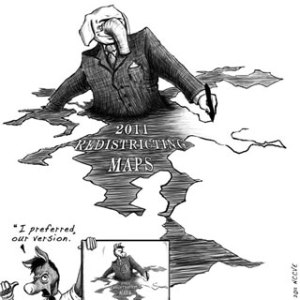 In advocating that reformers drop their efforts to change congressional redistricting procedures, however, Boehner essentially admitted to the deep corruption embedded in the system of election-rigging known as gerrymandering.
In advocating that reformers drop their efforts to change congressional redistricting procedures, however, Boehner essentially admitted to the deep corruption embedded in the system of election-rigging known as gerrymandering.
“For 40 years the Democrat Party had the pencil in their hands and for the last 20 years we’ve had the pencil,” he said. “When you’ve got the pencil in your hand, you’re going to use it to the best of your advantage.”
International observers deployed by the OSCE to monitor U.S. adherence to commitments in the Copenhagen Document have long pointed to the prevalence of gerrymandered congressional districts as one of the major hindrances to holding democratic elections in the United States.
The OSCE’s final report on the 2010 midterm elections noted for example that due to gerrymandering, “There is a broad perception that a significant number of congressional districts are non-competitive as the outcome of the election could be predicted with a high degree of probability. In these mid-term elections, one senator and 27 candidates for members of the House were elected unopposed.”
The OSCE reiterated a recommendation contained in the final report on the 2006 midterm elections: “With a view to ensuring genuine electoral competition in congressional districts, consideration could be given to introducing procedures for drawing district boundaries that will be based on criteria other than voters’ voting histories and perceived future voting intentions.”
In a publication issued in 2013, the OSCE further outlined best electoral practices for member states (including the U.S.), including a tacit criticism of the American system of drawing congressional districts. “Electoral constituencies should be drawn in a manner that preserves equality among voters,” noted the OSCE, adding that “the manner in which constituencies are drawn should not circumvent the principle of equal suffrage.”
This would help ensure the U.S. lives up to its obligations in the 1990 OSCE Copenhagen Document, including the following:
To ensure that the will of the people serves as the basis of the authority of government, the participating States will
(7.1) — hold free elections at reasonable intervals, as established by law;
(7.2) — permit all seats in at least one chamber of the national legislature to be freely contested in a popular vote;
(7.3) — guarantee universal and equal suffrage to adult citizens;
Another important reform adopted on Tuesday was a clean elections amendment approved by the voters of Maine, which beefed up their state financing systems as an alternative to big money. Specifically, the initiative strengthened the Maine Clean Elections Act by increasing funding from $2 million to $3 million for the Maine Clean Elections Fund, increasing penalties for violating campaign finance disclosure rules, adjusting political ad disclosure rules, and allowing candidates to qualify for additional funds.
The reform establishes the state of Maine as a U.S. leader in clean elections and transparency in campaign financing, another area that has long been a concern of international observers monitoring U.S. elections. Following last year’s midterm elections, OSCE observers noted:
The ability of independent special interest groups to produce and air campaign-style advertisements without disclosing their sources of funding limited the ability of voters to judge the information that they were presented with. This lack of transparency undermined the ability of legally mandated bodies to provide accountability. Further, the purely legalistic interpretation of what constitutes co-ordination between campaigns and political action committees undermined the legal framework intended to bring transparency to campaign spending.
Although international election-related commitments are somewhat ambiguous on the topic of campaign finance laws, it is widely understood that unregulated private money has the potential for tilting the playing field in favor of a particular party or candidate, thus potentially violating the requirement in the Copenhagen Document for OSCE member states to “provide political parties and organizations with the necessary legal guarantees to enable them to compete with each other on a basis of equal treatment before the law and by the authorities.”
In its 2013 guidelines, the OSCE warned of the impact that unregulated campaign financing can have on electoral systems, noting that “there is the risk of undue influence that can result from excessive or disproportionate contributions by a single contributor or group of contributors.”
Following the 2010 midterms, OSCE election observers noted that “Money played a significant role, creating an uneven playing field between candidates. About three-quarters of the total of upwards four billion dollars was spent on political campaign ads on television and radio. The ads inundated the airwaves, turning many voters off.”
In its statement on the 2012 general elections, the OSCE again stressed “the unprecedented and often negative role played by private campaign financing [which] has a potential to impact negatively on the fairness of the process.”
If more states begin following Maine’s lead, it could have a chance of finally leveling the playing field and improving the fairness of the process.
Sanders’ candidacy exposes fundamental flaws in U.S. electoral system
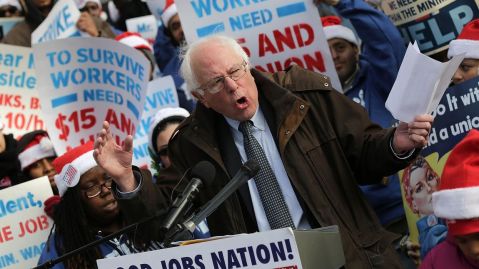
Sanders speaks to low-wage federal contract workers on Dec. 4, 2014, during a protest where the workers demanded presidential action to win an increase to $15-an-hour wage. – Win McNamee / Getty Images
A long-time independent and self-described socialist, Vermont Senator Bernie Sanders recently decided to run for president within the confines of the two-party system under heavy pressure from Democratic Party loyalists not to be a third party “spoiler” candidate.
For months, Sanders was the target of public appeals from groups such as Progressive Democrats of America that implored him to seek the nomination of the Democratic Party rather than run as an independent, as he has done in numerous Vermont elections since the 1970s.
As a PDA petition pointed out, in 2004 Sanders “understood the very real danger of total Republican control of the U.S. Government” and “supported Democratic nominee John Kerry for President over his long-time friend and ally, Ralph Nader.”
Similarly, in order “to prevent the current crazed, mean, and dangerous incarnation of the Republican Party from seizing total power,” it is important that Sanders “commit[s] to running in the 2015/2016 Presidential primaries as a Democrat,” PDA insisted.
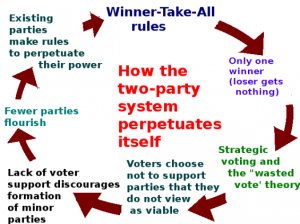 The fear of rank-and-file Democrats is that having a third party/independent challenger in a general election between a Democrat and Republican would siphon votes from the Democratic nominee, and hand the election to the Republican nominee. It is a fundamental flaw of the U.S. electoral system that perennial third party candidate Ralph Nader recently spoke about on Democracy Now.
The fear of rank-and-file Democrats is that having a third party/independent challenger in a general election between a Democrat and Republican would siphon votes from the Democratic nominee, and hand the election to the Republican nominee. It is a fundamental flaw of the U.S. electoral system that perennial third party candidate Ralph Nader recently spoke about on Democracy Now.
Asked why Sanders may have decided to forgo his longtime independent status in favor of seeking the Democratic nomination, Nader replied:
Well, that’s always been a dilemma he’s been deliberating for the last year or so. If he runs as an independent, he can go to November. If he runs as a registered Democrat, he’s done in April or May, assuming he doesn’t defeat Hillary Clinton or others, but he gets on the televised primaries. Where as an independent he could be marginalized, as a Democrat he’s going to get on quite a few debates and in the primary.
While what Nader said about the likelihood of being marginalized as an independent is certainly true, what he failed to mention is that it’s not only a candidate’s independent or third-party status that leads to media marginalization, but also – perhaps more importantly – what it is that the candidate has to say.
With his message of income inequality, corporate corruption and environmental sustainability, Sanders was pegged early on as an unserious fringe candidate by the media establishment, which is dominated by the very business interests that he rails against.
Just as Ron Paul’s antiwar message was systematically sidelined from mainstream media coverage in the 2012 presidential campaign – notwithstanding the fact that he ran as a Republican and boasted some traditional early indicators of a vibrant campaign – it seems that the media establishment has already made a determination that Sanders’ candidacy is not to be taken seriously.
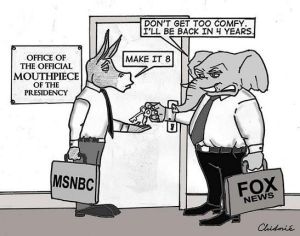 In an analysis for Media Matters for America, Eric Boehlert noted that despite Sanders’ campaign rallies drawing thousands of people – making them some of the largest campaign events of 2015 by either Democrats or Republicans – the media has decided not to cover them as major news events. Sanders’ first major campaign rally since announcing his presidential candidacy last month, for example, was completely ignored by the Washington Post and New York Times, while the network news programs night covered the event sparsely.
In an analysis for Media Matters for America, Eric Boehlert noted that despite Sanders’ campaign rallies drawing thousands of people – making them some of the largest campaign events of 2015 by either Democrats or Republicans – the media has decided not to cover them as major news events. Sanders’ first major campaign rally since announcing his presidential candidacy last month, for example, was completely ignored by the Washington Post and New York Times, while the network news programs night covered the event sparsely.
According to Boehlert, “At a time when it seems any movement on the Republican side of the candidate field produces instant and extensive press coverage, more and more observers are suggesting there’s something out of whack with Sanders’ press treatment. And they’re right.”
When Sanders does get reported on in the media, much of the coverage portrays him as outside the mainstream of American politics, or views him solely through the prism of Hillary Clinton. “It’s all about how his campaign might affect her strategy and her possible policy shifts, instead of how his campaign will affect voters and public policy,” Boehlert writes. “On the Republican side, candidates are generally covered as stand-alone entities, not as appendages to a specific rival.”
Beyond that, much of the coverage specifically declares that he has no chance of winning, an odd role for the media to play in covering a nomination campaign. The press, after all, is supposed to be covering the nomination process, not determining the nomination process. Yet, this is what a few prominent news outlets have had to say in recent weeks: “Bernie Sanders isn’t going to be president,” declared a Washington Post headline. “He Won’t Win,” said Newsweek, “So Why Is Bernie Sanders Running?” MSNBC: “Why Bernie Sanders matters, even if he can’t win.”
The clear consensus among the media elite is that Sanders’ candidacy is little more than an annoyance, sort of like ants at a picnic. Sanders is to be tolerated at best but certainly not to be welcomed or treated with the respect and reverence that a “real” presidential candidate like Hillary Clinton or Jeb Bush are to receive.
This media bias is infuriating to those who would like to see the press perform its role as a reporter of the news rather than as a shaper of the news, but beyond being aggravating it is also arguably a violation of international commitments on holding free and fair, democratic elections.
As a signatory to the Organization for Security and Cooperation in Europe’s 1990 Copenhagen Document, the United States has agreed to certain commitments to ensure genuinely democratic elections, one of which being equal media access for election stakeholders. Specifically, OSCE countries must ensure “unimpeded access to the media on a non-discriminatory basis for all political groupings and individuals wishing to participate in the electoral process.”
As the OSCE’s Office for Democratic Institutions and Human Rights (OSCE/ODIHR) further explains in its handbook for election observation,
Equal conditions should be ensured for all participants in the election process so that they compete on a level playing field. … Candidates and political parties should have unimpeded access to the media on a non-discriminatory basis, and state or public media should meet their special responsibility for providing sufficient, balanced and impartial information to enable the electorate to make well-informed choices.
This requirement for media access and balance goes for both major party candidates and minor party candidates, and besides media access, OSCE countries must also “respect the right of citizens to seek political or public office, individually or as representatives of political parties or organizations, without discrimination.”
Both the endemic media bias in the United States and the two-party system itself – which systematically discriminates against parties other than the Democrats and Republicans – are likely violations of these obligations, which also include respecting “the right of individuals and groups to establish, in full freedom, their own political parties or other political organizations and provide such political parties and organizations with the necessary legal guarantees to enable them to compete with each other on a basis of equal treatment before the law and by the authorities.”
These are all areas in which the U.S. is failing to live up to democratic standards for elections, despite its frequent claims of being the greatest democracy in the world, and could do much better.
U.S. midterms fall short of international standards for democratic elections
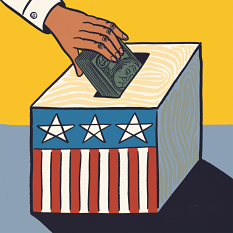 With the “truly staggering” role of money in campaigns “overshadowing the real issues at stake in the elections,” Tuesday’s midterm elections in the United States failed to meet a number of important international commitments, election observers from the Organization for Security and Cooperation in Europe said in a press release issued Wednesday.
With the “truly staggering” role of money in campaigns “overshadowing the real issues at stake in the elections,” Tuesday’s midterm elections in the United States failed to meet a number of important international commitments, election observers from the Organization for Security and Cooperation in Europe said in a press release issued Wednesday.
“This country has once again demonstrated that its commitment to democracy is undiminished,” said Isabel Santos, leader of the OSCE observers. “However, the amount of money involved in campaigns has become truly staggering. With certain individuals and groups now spending millions on elections – amounts wildly beyond the capacity of average citizens – there is increasing inequality in the process.”
Although the two main parties’ campaigns were widely covered in the media (which of course completely ignored the campaigns of smaller parties), much of the focus was on campaign funding and polling data rather than substantive policy issues, the observers noted.
“The campaign was active and competitive, but often with negative advertising and mutual accusations lowering the quality of debate and turning voters off. Discussion of the real policy challenges facing the country suffered as a result,” said Santos.
The observers further raised concerns over the lack of transparency in campaign financing:
The ability of independent special interest groups to produce and air campaign-style advertisements without disclosing their sources of funding limited the ability of voters to judge the information that they were presented with. This lack of transparency undermined the ability of legally mandated bodies to provide accountability. Further, the purely legalistic interpretation of what constitutes co-ordination between campaigns and political action committees undermined the legal framework intended to bring transparency to campaign spending.
Another area highlighted by the OSCE pertained to the systematic disenfranchisement of felons and ex-felons in many states around the country, as well as the lack of congressional representation for residents of Washington, DC:
Voting rights of felons and ex-felons are determined by state law and the content of these laws varies broadly. The United States, as all OSCE countries, has committed itself to guaranteeing universal and equal suffrage to all adult citizens. The lack of voting rights for felons, including permanent disenfranchisement in some states, is at odds with this commitment, as is the lack of a voting representative in Congress for citizens in the District of Columbia.
More generally, the OSCE was concerned by the “highly decentralized” legal framework governing elections in the U.S. “While the laws are well understood and the elections are professionally administered, the decentralized system results in varied access for both contestants and voters to the electoral system,” according to the statement.
Judicial rulings and legislative changes in recent years have significantly impacted the framework governing elections, including in the politically sensitive fields of campaign finance, redistricting and identification requirements. The observers expressed concern regarding requirements in some states that voters present photo identification in cases where the authorities do not freely and readily provide such identification.
“Governments have a responsibility to facilitate voting for their population, and I hope that efforts will continue to make access as simple as possible for all American citizens. The requirement in some states that voters must first acquire photo identification can potentially inhibit voting by some, particularly those at lower socio-economic levels,” said Santos.
According to a preliminary analysis by Wendy Weiser of the Brennan Center for Justice, these new practices have likely impacted the results of the elections in several key states. In the North Carolina Senate race, for example, state house speaker Thom Tillis beat Senator Kay Hagen by a margin of 1.7 percent, or about 48,000 votes.
At the same time, Weiser explains,
North Carolina’s voters were, for the first time, voting under one of the harshest new election laws in the country — a law that Tillis helped to craft. Among other changes, the law slashed seven early voting days, eliminated same-day registration, and prohibited voting outside a voter’s home precinct — all forms of voting especially popular among African Americans. While it is too early to assess the impact of the law this year, the Election Protection hotline and other voter protection volunteers reported what appeared to be widespread problems both with voter registrations and with voters being told they were in the wrong precinct yesterday.
Some numbers from recent elections suggest that the magnitude of the problem may not be far from the margin of victory: In the last midterms in 2010, 200,000 voters cast ballots during the early voting days now cut, according to a recent court decision. In 2012, 700,000 voted during those days, including more than a quarter of all African-Americans who voted that year. In 2012, 100,000 North Carolinians, almost one-third of whom were African-American, voted using same-day registration, which was not available this year. And 7,500 voters cast their ballots outside of their home precincts that year.
There were many irregularities reported across the country on and before election day, for example in Georgia, where more than 40,000 voter registrations went missing, most of them representing communities of color, who largely support Democrats.
Speaking on Democracy Now on Tuesday, Georgia state Representative Stacey Abrams described how this may have happened. The state of Georgia, she explained, headed by the secretary of state, requires that every registration form goes through a series of screens, including the Social Security Administration proof of citizenship.
“And the problem is that, according to experts, that proof could be a false negative almost 40 percent of the time, which means that you could have a 20-year-old who’s a college student without an ID, without a driver’s license, who submits his Social Security number and is rejected falsely but is never told that they’re rejected and is never told why,” she said. “And we think that a variety of these problems—clerical errors, screenings—these have all led to more than 40,000 of our applications not being properly processed.”
Ben Jealous, chair of the Southern Election Fund, further explained how Georgia’s secretary of state, Brian Kemp, may have been involved in impacting the failure to process the tens of thousands of voter registration forms.
“What is terrifying about Georgia,” Jealous said,
is you see how a man who could be a good man on most days, Mr. Kemp, can get worried, in a very public way, about the impact of these changes in who’s voting in Georgia and how it could impact his party, and then very publicly appear to be dragging his feet. The allegations that he made are so ridiculous, it’s just like hard to comprehend. Georgia’s law says as soon ink goes onto a voter reg form, it has to be turned in. So if I hand you a form at your door and you write down “Mickey Mouse,” I’ve got to hand it in. When you have a law like that, up to 10 percent of the forms can be impacted. Out of 86,000, he’s been able to find maybe 50. You know, if it was above, say, 8,600, we would be concerned, because it’s their own law that requires you to turn in these problematic forms. They’ve done such a great job, when there could have been 86,000, there’s 50.
Prior to the election, Kemp had publicly fretted about how many new Democratic voters were being registered in his state, further raising concerns about his role in intentionally disenfranchising would-be voters:
After we get through this runoff, you know, the Democrats are working hard. And all these stories about them, you know, registering all these minority voters that are out there and others that are sitting on the sidelines, if they can do that, they can win these elections in November.
The inappropriate roles that partisan secretaries of states and other election administrators play in U.S. elections have long been a concern of OSCE observers. As the OSCE Office for Democratic Institutions and Human Rights put it in its final report on the 2012 U.S. election:
General elections are administered at the state level and there is no federal election management body with oversight responsibilities. On the state level, administrative authority is vested in the respective state secretary or state election board. However, the greater part of election administration is typically delegated to county or lower-level election officials, resulting in a wide variety of electoral practices across the country. …
While some senior election officials are appointed, others are elected. Election administration bodies are often partisan, although 19 states and the District of Columbia provide bipartisan or independent bodies. Very few OSCE/ODIHR LEOM interlocutors raised concerns about the impartiality of county election officials. However, some county-level election supervisors ran on party tickets for re-election in 2012, raising possible conflicts of interest.
In order to avoid these conflicts of interest, the OSCE recommended that “if senior election officials at state and lower levels are elected, the states could consider holding such elections in non-federal election years, to avoid any real or perceived conflicts of interest.”
Further, “there should be a national body with sufficient resources and outreach capacity to provide guidance on election administration and serve as a central clearinghouse to develop good electoral practices. Congress should ensure that such a body has the necessary financial and human resources to fulfil these duties in an effective manner.”
Needless to say, this has not taken place in the United States, which tends to brush off and ignore the recommendations from the international community on how to better meet its obligations on holding democratic elections (as well as all other international norms).
Voting wars, election-rigging in full effect heading into U.S. midterm season
With mere hours before polling stations were scheduled to open in Ohio for early voting in November’s midterm congressional elections, the Supreme Court on Monday blocked voters from beginning to cast their ballots. In a 5-4 party-line vote, the Justices backed a Republican plan to limit early voting in Ohio by granting the state’s request to stay decisions of lower courts that threw out the state’s new plan, passed by the Republican-led legislature.
Last week, the Sixth Circuit Court of Appeals had upheld a lower court’s ruling in in NAACP v. Husted, which stopped new restrictions on early voting in Ohio from taking effect. The case concerned a state law passed earlier this year eliminating Ohio’s limited window for same day registration and early voting, which tens of thousands of voters have taken advantage of in the past two presidential elections.
Evidence presented in the lower court showed that African American, low-income, and homeless voters were more likely to use this voting opportunity. The Sixth Circuit affirmed the district court’s preliminary injunction, based on its conclusion that the NAACP and other plaintiffs had shown likely violations of both the Constitution and the Voting Rights Act.
Ohio’s Republican Attorney General and Secretary of State, however, immediately filed an emergency petition with the United States Supreme Court to block the Circuit Court’s ruling.
Now, the Supreme Court has sided with the Ohio Republicans, who argued that Ohio’s early voting opportunities are more generous than most states’. Further, as Ohio’s Republican Secretary of State Jon Husted argued, the ruling by the lower court “eliminates elected officials’ ability to do what we elected them to do . . . Whether we vote 35 or 28 days, by mail or in person this November, elected officials and not federal judges should be making Ohio law.”
There has been a lenghty legal battle over voting in Ohio since 2004, when long election-day lines meant some Ohio residents missed the chance to vote. Laws passed by Democratic-controlled legislatures have created extensive early voting opportunities, but when Republicans have controlled the legislature, they have sought to roll back those laws.
International election observers from the Organization for Security and Cooperation in Europe have generally welcomed the implementation of early voting in the United States as an important component of addressing the country’s notorious election day capacity problems. OSCE observers noted for example in 2008:
While prior to the elections concern was expressed over the ability to process the expected record turnout, the large amount of early voters likely played an important role in making election day successful and absent of major problems. Still, it is clear that early voting did not remedy all capacity problems, as witnessed by voters having to wait to vote for often many hours in numerous places around the country.
The Ohio case is not the only one being currently decided in the courts. In fact, with midterm elections less than six weeks away, the rules for voting in several states are still unclear. Courts are currently considering challenges to voter ID requirements in Texas and Wisconsin, and whether new restrictions on early voting in North Carolina and Ohio should stay in place. All this uncertainty is making the jobs of election administrators more difficult.
“Voters and elections officials need to know what the rules of the game are going to be several weeks before the election,” says Daniel Tokaji, an election law expert with the Moritz College of Law at Ohio State University.
But right now in several places, they don’t, he says.
As electionlineWeekly reports,
Nowhere does it seem have recent court rulings been more acutely felt than in Wisconsin.
Last week the 7th Circuit Court of Appeals reinstated the state’s voter photo ID law and now elections officials, state agencies and colleges and universities are scrambling to not only inform voters about the law, but make sure voters have the necessary ID.
The state’s Government Accountability Board (GAB) said at a press conference following the ruling that they are taking “extraordinary efforts” to put the ID law into place.
“Implementing the photo voter ID law close to an election will not be easy,” GAB Executive Director Kevin Kennedy said at the press conference. “But the GAB and Wisconsin clerks are up to the challenge.”
The Florida Supreme Court is currently considering a case over the state’s congressional district map, which opponents say has been gerrymandered, or purposefully drawn to give unfair electoral advantage to one side. Last Friday, the court heard arguments over whether documents that played a central role in a redistricting trial which compelled the state legislature to redraw its congressional districts should remain secret or be made public.
As reported by the Florida Herald-Tribune,
In dispute are 41 pages of documents from Pat Bainter, a Gainesville-based Republican consultant who runs Data Targeting. The documents played a central role in Judge Terry Lewis’ decision this year to reject Florida’s congressional redistricting map, ruling that two districts violated the state constitutional ban against partisan line-drawing.
Although Data Targeting was not directly named in the lawsuit that challenged Florida’s 27 congressional districts, the groups that sued contend the documents proved that the consultants worked in concert with Republican legislators to violate the state’s Fair Districts amendments. The Florida Supreme Court is under no time constraint to issue a ruling and it’s unclear when a decision is expected.
All of the cases currently working their way through the courts and causing such confusion for election officials and voters have one thing in common. The root problem is that partisan interests are given free reign over election administration in the United States. From the national level to the state level to the local level, elected representatives and partisan hacks manipulate and game the system to ensure preferred electoral outcomes, in a system generally out of step with international electoral standards.
As the OSCE Office for Democratic Institutions and Human Rights rather mildly put it in its final report on the 2012 U.S. election:
General elections are administered at the state level and there is no federal election management body with oversight responsibilities. On the state level, administrative authority is vested in the respective state secretary or state election board. However, the greater part of election administration is typically delegated to county or lower-level election officials, resulting in a wide variety of electoral practices across the country. …
While some senior election officials are appointed, others are elected. Election administration bodies are often partisan, although 19 states and the District of Columbia provide bipartisan or independent bodies. Very few OSCE/ODIHR LEOM interlocutors raised concerns about the impartiality of county election officials. However, some county-level election supervisors ran on party tickets for re-election in 2012, raising possible conflicts of interest.
In order to avoid these conflicts of interest, the OSCE recommended that “if senior election officials at state and lower levels are elected, the states could consider holding such elections in non-federal election years, to avoid any real or perceived conflicts of interest.”
Further, “there should be a national body with sufficient resources and outreach capacity to provide guidance on election administration and serve as a central clearinghouse to develop good electoral practices. Congress should ensure that such a body has the necessary financial and human resources to fulfil these duties in an effective manner.”
Recent Posts
- U.S. accuses Russia of war crimes but undermines the international body that prosecutes war crimes
- Global condemnation of Russia’s war on Ukraine underscores international community’s hypocrisy
- Jill Stein-bashing and the internationally recognized right of third parties to compete
- ‘Russiagate’ impeachment push reveals U.S. indifference to corruption and war crimes
- World moves to ban nuclear weapons as U.S. flouts obligations, moves to revamp arsenal
Categories
Blogroll
- ACLU
- Amnesty International
- Arms Control Now
- Bill of Rights Defense Committee
- Center for Research on Globalization
- Death Penalty Information Center
- Democracy Now!
- Essential Opinion
- Fair Vote
- Global Issues
- Global Security Newswire
- Human Rights First
- Human Rights Watch
- If Americans Knew
- Institute for Policy Studies
- Jurist.org
- Just Foreign Policy
- Latino Political Avenue
- National Lawyers Guild
- National Security Archives
- Partnership for Civil Justice
- People's Blog for the Constitution
- Republic Report
- SCOTUSblog
- Torture Accountability Center
- US Campaign to End the Israeli Occupation
- US Human Rights Network
- Witness Against Torture
